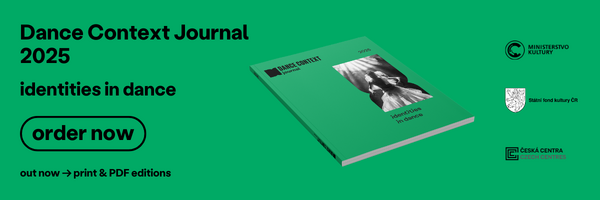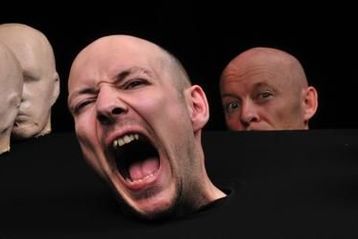Palle, how does Gustav Mahler’s music inspire you in terms of masculinity?
Directly because it is the opposition of it - and for me as a choreographer the opposition is what I need. I did the piece 2men2mahler to the Lieder music of Mahler, with 1 singer and 1 musician performing live music; that was like an experiment, a small research on Mahler and Men. I saw it did work together and therefore I could go deeper and further.
With Palle Granhøj and Tomáš Danielis about Men and Mahler
Closing night of the Small Inventory festival was dedicated to one of the most welcome foreign guests at Ponec Theatre, the Granhøj Dans company. Men and Mahler is a study of eight men through the eyes of a woman who is trying to experience the men's world and its mysterious rituals. Her enthusiasm resembles a commentator of science documentaries who accidentally found herself facing incomprehensible games where strength, stamina and fortitude are the rulers. Cultivated motion humour, so typical of the Granhøj company, subtly mingles with mystical live paintings set to Mahler's music. Men on the stage are exposed and examined like rare butterflies, whose behaviour in the group remains an admired mystery to us.
How did you choose the music excerpts? Did you go over all Mahler?
Yes, it took me few years to listen to all the Mahler’s music, but it was worth... I went to an island with my headphones and just listened to it over and over again. In today’s piece it was mostly the excerpts from symphonies.
As for what I was searching for --- the Mahler´s music is described as the most dark, heavy music with very strong sense of longing, painfulness... I was looking for the most painful parts, with long strokes, the most silent, very slow melodies... and this music takes you and touches you really hard.... and there I feel that the masculine strength and vigour is in the real opposition to it.
Sometimes you let the singer sing alone without the accompanying sound of orchestra... do you think about the lyrics at all?
That is from the Lieder but ... I didn’t choose it according to the lyrics... it is very dark, about death and depression, but the public is not meant to hear the lyrics.
The girl singer is commenting the men’s life through her eyes... why do you need her there?
Let me ask you a question: was it working for you?
Well yes, because as a woman I could understand her points, although I missed the portray of men in the interaction with women...
Well this piece is about the men when they are alone, there is no sexual relationship in this piece... We can say it is a sex free choreography.
The girl is for me somebody like David Attenborough... he was the first TV commentator in the productions about animals and the wild life... he just went to the jungle and did the shots 1m in front of the lion p.e. Then there was this Desmond Morris, who described the humans as animals... That was the inspiration for Dorte.
She is an interpretation between the men and audience... but do I like it? I hate it! Sometimes she is just so annoying! Every time I watch the piece I wish her to stop ... of course I put her there on purpose but for me she is really annoying. Don’t you think so?
No, not really, it was fun to have her there.
Yes, because you are a woman. If I come to men after the show, the men agree that she was annoying, but the ladies have fun... it is a different perceiving of the theme. But I think she is fantastic and giving spice to that piece.
When you speak about masculinity, you seem not to mention any gay problematic... did you avoid it on purpose?
That’s an interesting question, but I don’t think I was thinking about this... It would be a good question for the audience, if they wonder about it. For me, the purpose was to speak about man as the human kind, not to tell a story of their interaction, there are no scenes about sex (or at least I didn’t put them in), for me it is a sex-free choreography... but maybe a gay audience would see something different, and that is also possible. In the theatre I just give questions and I don’t offer answers... it is up to the audience to see what they see; it is their privilege to perceive differently.
You portray different male characters in the piece, how did you work with the men?
I was inspired by them and their own material and picked what I needed. We have a guy who weights 96 kg, one who is 52 years old, another one who is 20, they all have different education, we have ballet dancers, we have 2 or 3 performers who would never say that they are dancers...
How did you choose the dancers?
There were auditions in Prague, Budapest and Vilnius... in Prague there were but few Czech dancers for the audition, but there were people from Slovakia, Slovenia, Hungary, Poland.
What was it like to work just with male dancers? Different from purely women collective I guess....
Yes I experienced it in my piece 8IQ No women no cry... wow :) But now I didn’t feel any conflicts between the men. I felt kindness and support, really giving, I didn’t see jealousy... so actually I have just hired all of them for the next project :)
Slovak dancer and choreographer Tomáš Danielis took part in the performance too. Already during his studies in Banská Bystrica and at the Academy of Performing Arts in Bratislava VŠMU he was enticed by the idea of collaboration with foreign artists such as David Zambrano and Frey Faust, getting to the projects with Willi Dorner or Felix Ruckert, as a dancer he was a part of the Slovak National Theatre ballet, the Croatian National Theatre ballet in Rijeka and Staatsoper in Graz. As a choreographer he is remembered by audiences at festivals such as Štyri dni tanca pre vás and Hybaj ho! and those who have seen his solo choreographies Loose Leaf, Jade, Damnation or On the red lawn.
You studied in Slovakia, but you have not been around that much lately – where do you actually live?
Well, in my suitcase, actually... on the go all the time. I own an association in Graz, Austria, but I often co-produce with Slovak productions as well, in September, for instance, I was doing a project in Barcelona. Unfortunately, the economic state of affairs in culture is so different here and abroad that I simply cannot work more in Slovakia.
How did you get to GranhøjDans? Is this the first time you work with them?
Yes, I just came to Prague to audition and that was it. Actually, the Prague audition was the most successful of the lot, he picked four of us here, Aaron, Aurelio, Mikołaj and me. Interestingly enough, no Czech dancer got through the auditions in Prague.
What was it like to work in a group of 8 men? How did the whole process go?
Peacefully indeed, although it was certainly a big dose of testosterone in one go too. But Palle is a very relaxed and positive person, so all went very peacefully. He let us work and shot the material he was interested in, then he went through it and assigned new tasks to us. We had been working like this for about a month and then started to put it together. The whole group works very intelligently, they have their own theatre and their own apartments in it, so we stayed there with the whole group. Simply there was no stress, just great generosity and a really pleasant environment.
Do you feel any self-fulfilment in this piece? Any authentic output of yours?
Only to a certain extent, of course, as a choreographer, I would obviously have a tendency to put more of myself into it. It is for sure that a part of the nature of my character comes from me, Palle tried to seek the authenticity by the destruction of our own material, but again this very much depends on his subjective perception. Anyway, from the beginning he had a clear idea of what he wanted and needed from each of us, so that sort of limited us.
Do you fall in with the stereotype of masculinity as presented in this piece?
Well, it is for sure that some parts and comments aptly describe men, but I have no idea about the performance as a whole as I am a part of it and I cannot see it in its entirety. I am not the sort of person that identifies with each role, it would have to be a portrait solo, I am just an interpreter of choreographer’s perception, just another part of the group. I think that in terms of masculinity as a theme, it depends largely on what sort of spectator is watching the performance and what he or she expects, obviously, it is impossible to draw all layers in detail in just one hour.
What inspired you the most about this collaboration?
It would have to be the way he works with classical music. I went through a classical training, but when I saw how he works with musicality, how he puts together music and movement, I really appreciated it. He had pre-selected excerpts from the very beginning, so for a month we were rehearsing to Mahler’s music without actually being aware of it in the end... he had a very clear idea. I think this collaboration was a success, actually, there is already another project coming in the autumn.
Men and Mahler
Choreografie: Palle Granhøj
Peforming: Bill Eldridge, László Fülöp, Áron Darabont Leon, Tomasz Ciesielski, Mikolaj Karczewski, Tomás Danielis, Aureliusz Rys, Petras Lisauskas a Dorte Petersen.
Asistent: Johan Ohlson
Music: Gustav Mahler
Production: Bora Bora, Granhøj Dans and Nová síť
Premiere: 8. 6. 2012 in Ljubljana



